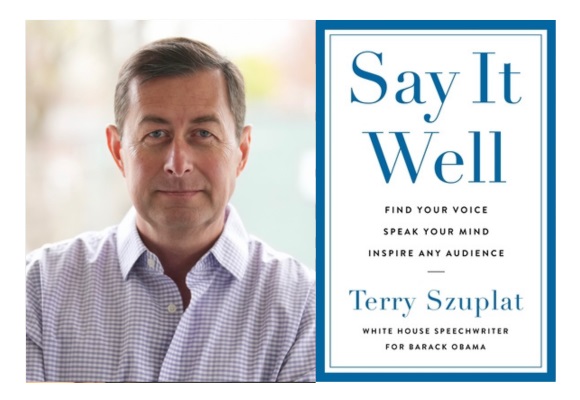“Now that’s a mic-drop moment.”
“You’re a rockstar.”
I was sitting in a large room in the basement of the Washington State Capitol building for my very first fireside chat, sharing my personal experience bridging divides and the audience sat rapt. At this point, I’ve given plenty of speeches and presentations in my career. This one, though, was in my own state, to some pretty important people, and I was uncharacteristically nervous. Thankfully, I’d been reading Terry Szuplat’s Say It Well in the leadup to this talk. It felt like a rich, story-filled guidebook to improving my public speaking, set almost exclusively in my usual context: politics. Say It Well delivered; at the end of my chat, I felt like I’d leveled up by following Terry’s tips.
Szuplat writes about speaking through the lens of his career advancement and most famous job: President Obama’s speechwriter. Near the beginning of the book, he introduces us to a process he calls “The Download,” which is when President Obama would sit down with his team of speechwriters, answer their questions, and “download” to them the things that he wanted to convey in the speech or speeches they were currently writing. In Say It Well, Szuplat reprises this to summarize each chapter and highlight the main points, helpful whether you’re skimming through or reviewing as a reference book.
“Say What Only You Can Say,” the apt title of Chapter 2, echoed in my mind as I wrote my comments ahead of a talk. What about my upbringing would be interesting to this audience? How did my story prepare me to build the bridges I focused on in my talk? I was thinking hard, too, thanks to Terry. Szuplat offers a rule of thumb for public speaking: The 50-25-25 Rule. He recommends splitting your prep time like this; think for 50%, write for 25%, and practice for 25%. Though I’d never heard this rule before, it’s roughly what I’ve found effective in my own trial and error over time and something I’ll continue practicing.
Speaking of rules, Szuplat has broken many. From the beginning, he lets readers in on a secret: He was always a speechwriter, never a speaker. He never took a speechwriting class. He never took a public speaking class. Everything he knows, he learned through experience– his own and others. He was terrified of public speaking and wanted to help other people overcome their fear like he did. This guidebook to communicating well isn’t written for a specific audience type (though political junkies will particularly appreciate the plentiful storytelling from political events and President Obama’s rise to fame) or speaking engagement. He covers eulogies, wedding toasts, partisan cheerleading, camaraderie building, and even acknowledgments.
That’s not to say I agreed with everything Szuplat wrote in Say It Well. As a conservative, there were parts of the book that gave me pause and made me wish we were sitting across from each other so we could talk it through. For example, Szuplat makes a point to remind readers that “Republicans … want what’s best for their children, too,” and that it’s nearly “impossible to really know other people’s true motivations.” He also encourages people to call out racism, homophobia, and other forms of bigotry. In the narrowest sense, I agree that we should call out racism and bigotry— it’s part of the bad conduct that we should change. But I could write a whole book about the differences between how conservatives and progressives understand racism, homophobia, and transphobia as a conservative who has been called all three of those. Szuplat also makes an exception for condemning “authoritarians who threaten democracy and human rights” and I worried that some people would read that as an excuse to lean into some stereotypes about their political opposition.
Clearly, I disagree with some of the ways he advises active partisans to engage and much of his politics… and in Braver Angels, that’s the point! We don’t have to agree with someone’s perspective to learn from it. Sincere and substantive disagreement teaches us to see other perspectives and challenges us to improve our arguments or change our minds. Say It Well grew me as a speaker, who—as a Red in a Blue state—is often in a position to share Red perspectives in very Blue rooms. This is easily the best book on public speaking that I have ever read, and I highly recommend it to spark your enthusiasm for public speaking. Whether you need to make a memorable toast at your brother’s wedding, inspire enthusiasm for your cause or campaign, or just perform better at Toastmasters, this book is a joy to read and ensures the next time you need to say something important, you’ll Say It Well.




